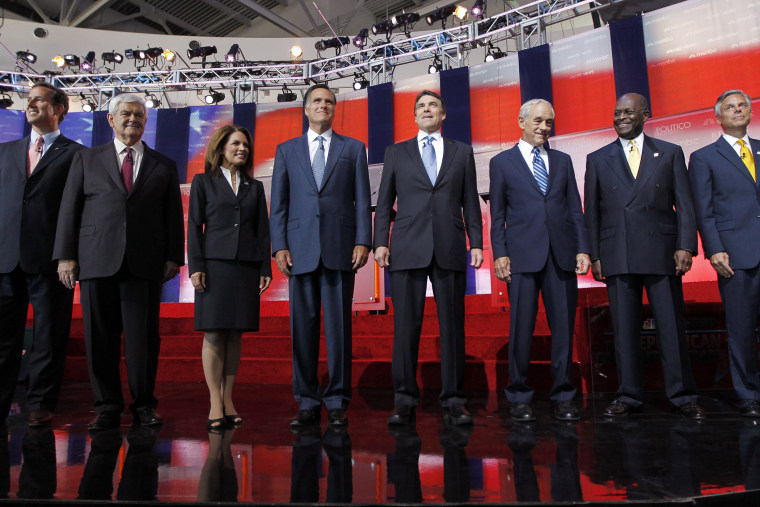For political junkies, the race for the 2012 Republican presidential nomination was one of the greatest reality shows of all time. A seemingly endless series of debates pushed GOP candidates to pander constantly to extremists; cast the Republican base in a negative light; and produced soundbites that Democrats were able to exploit for the entirety of the cycle.
The Republican National Committee is committed to learning from its mistakes and keeping the circus
under tight control in the 2016 election.
Virtually every Republican leader agrees that the 20 GOP debates in the last presidential primary season damaged Mitt Romney -- remember "self-deportation"? -- and briefly made front-runners out of eventual flameouts like Herman Cain and Newt Gingrich. Party leaders vowed never to let it happen again. On Thursday, they took action, moving at a Republican National Committee meeting here to dramatically cut the number of GOP primary debates -- possibly in half. A group of 13 RNC members, essentially operating under the control of party Chairman Reince Priebus, will choose the timing, location and media partners of the 2015-2016 Republican primary debates. They will insist that conservative panelists join moderators from the mainstream media.
That last part is of particular interest.
Last summer, when the RNC was apoplectic about some proposed biopics on Hillary Clinton, RNC Chairman Reince Priebus
told msnbc he intends to reject 2016 debate moderators unless he considers them sufficiently "interested in the future of the Republican Party and our nominees."
In other words, debates aren't news events or forums intended to benefit voters; they're supposed to be a sort of infomercial -- friendlier questions, fewer events, reduced gaffe opportunities.
And according to the new plan, if Republican presidential hopefuls participate in debates the RNC disapproves of, the candidates will face sanctions, including possible exclusion from other "real" debates.
There's still time for changes to the RNC's 2016 plan, but at this point, the revisions are facing little resistance -- the RNC's rules panel
easily approved the plan yesterday and the full party committee is expected to do the same today.
The underlying point of these "reforms" is hard to deny: the Republican debates in 2011 and 2012 did legitimate harm to the party. Trying to put a lid on the total makes a lot of sense.
But as the election season nears, the fact that Republicans hope to control the content of the debates by including "friendly" moderators is an awkward solution to a more systemic problem. If the fear is that GOP candidates will adopt outrageous postures to satisfy extremist voters, the problem runs deeper than who asks the questions at a televised debate.
What's more, let's not forget the Republican National Committee's
own autopsy following the party's 2012 losses:
"The Republican Party needs to stop talking to itself. We have become expert in how to provide ideological reinforcement to like-minded people, but devastatingly we have lost the ability to be persuasive with, or welcoming to, those who do not agree with us on every issue."
Two years later, the same party that published this has decided to talk to itself more, not less, in the next national cycle.
